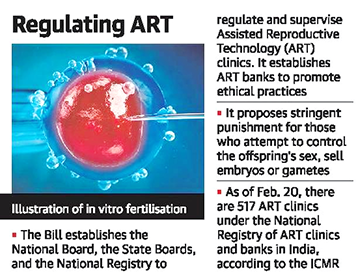Governance
Assisted Reproductive Technology (Regulation) Bill, 2021
- 02 Dec 2021
- 6 min read
Why in News
Recently, the Lok Sabha has passed the Assisted Reproductive Technology (Regulation) Bill, 2021.
- The bill has excluded live-in couples, single men and the LGBTQ community.
Key Points
- Background:
- The Government had been working on the bill to regulate the ART industry since 2008 when it was first drafted by the Indian Council of Medical Research (ICMR).
- The bill was first introduced in Lok Sabha in 2020 but the House had referred it to a standing committee.
- About the Bill:
- National Registry and Registration Authority:
- The bill proposes the establishment of a national registry and registration authority for all clinics and medical professionals serving in the field.
- It will help in maintaining a database of all clinics and medical professionals serving in the field.
- State governments will appoint registration authorities for facilitating the registration process. The registration will be valid for five years and can be renewed for a further five years.
- The bill proposes the establishment of a national registry and registration authority for all clinics and medical professionals serving in the field.
- Regulate ART Services:
- It seeks to regulate and supervise Assisted Reproductive Technology (ART) clinics and ART banks, prevent misuse, adopt safe and ethical practice and so on.
- National Board:
- The bill proposes the constitution of a national board.
- The board will set minimum standards of physical infrastructure, laboratory, diagnostic equipment and expert manpower to be employed by clinics and banks.
- The bill proposes the constitution of a national board.
- Stringent Punishment:
- It further seeks stringent punishment for those practicing sex selection, sale of human embryos or gametes, or found running agencies, rackets and organisations for such practices in violation of the law.
- For First-Time Offenders:
- It may attract a penalty between Rs. 5 lakhs and Rs. 10 lakhs.
- For Subsequent Contraventions:
- Punishable with imprisonment for a term between eight and 12 years, and a fine between Rs. 10 and Rs. 20 lakh.
- Any Clinic or Bank Advertising or Offering Sex-Selective ART:
- Punishable with imprisonment between five and ten years, or fine between Rs. 10 lakh and Rs. 25 lakh, or both.
- For First-Time Offenders:
- It further seeks stringent punishment for those practicing sex selection, sale of human embryos or gametes, or found running agencies, rackets and organisations for such practices in violation of the law.
- National Registry and Registration Authority:
- Need:
- To Standardise Protocols:
- There are so many such ART clinics that have been running without regulation and there are implications on the health of those who undertake the procedure.
- If there is no regulation, the unethical practices will increase.
- There are so many such ART clinics that have been running without regulation and there are implications on the health of those who undertake the procedure.
- To Protect Women and Children:
- The oocyte (a cell in an ovary) donor needs to be supported by an insurance cover. Multiple embryo implantation needs to be regulated and children born through ART need to be protected.
- To Standardise Protocols:
- Concerns:
- Discrimination in Accessibility:
- The Bill allows for a married heterosexual couple and a woman above the age of marriage to use ARTs and excludes single men, cohabiting heterosexual couples and LGBTQ+ individuals and couples from accessing ARTs.
- Duplicacy:
- Both Surrogacy and ART Bills will set up multiple bodies for registration which will result in duplication or worse, lack of regulation.
- For example, a surrogacy clinic is not required to report surrogacy to the National Registry.
- Both Surrogacy and ART Bills will set up multiple bodies for registration which will result in duplication or worse, lack of regulation.
- Violates Article 14:
- The bill violates Article 14 of India's constitution and is also silent on the rights of children.
- According to Article 14, equality before law and equal protection of law to any person within India cannot be denied.
- The bill violates Article 14 of India's constitution and is also silent on the rights of children.
- Cost of the Services:
- The cost of the procedure should be effectively monitored so that even the poor can avail of its services.
- Discrimination in Accessibility:
Assisted Reproductive Technology (ART)
- ART is used to treat infertility. It includes fertility treatments that handle both a woman's egg and a man's sperm. It works by removing eggs from a woman's body and mixing them with sperm to make embryos. The embryos are then put back in the woman's body.
- In Vitro fertilization (IVF) is the most common and effective type of ART.
- ART procedures sometimes use donor eggs, donor sperm, or previously frozen embryos. It may also involve a surrogate carrier.
Way Forward
- Clinics must have ethics committees and mandated counselling services should be independent of them.
- Prior versions of the Bill regulated research using embryos, which must be brought back and definitions of commissioning “couple”, “infertility”, “ART clinics” and “banks” need to be synchronised between the Bill and the Surrogacy (Regulation) Bill.
- All ART bodies should be bound by the directions of central and state governments in the national interest, friendly relations with foreign states, public order, decency and morality.
- All the constitutional, medico-legal, ethical and regulatory concerns raised by the Bill must be thoroughly reviewed before affecting millions.





